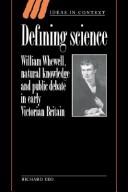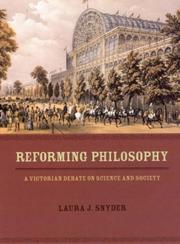| Listing 1 - 6 of 6 |
Sort by
|
Book
ISBN: 1139105418 1108038530 Year: 2012 Publisher: Cambridge : Cambridge University Press,
Abstract | Keywords | Export | Availability | Bookmark
 Loading...
Loading...Choose an application
- Reference Manager
- EndNote
- RefWorks (Direct export to RefWorks)
William Whewell (1794-1866) was born the son of a Lancaster carpenter, but his precocious intellect soon delivered him into a different social sphere. Educated at a local grammar school, he won a scholarship to Cambridge, and began his career at Trinity College in 1812; he went on to be elected a fellow of Trinity in 1817 and Master in 1841. An acquaintance of William Wordsworth and a friend of Adam Sedgwick, his professional interests reflected a typically 19th century fusion of religion and science, ethics and empiricism. Published in 1876, and written by the mathematician and fellow of St John's College, Isaac Todhunter (1820-84), this biography combines a narrative account of Whewell's life and achievements with extracts taken from his personal correspondence. Volume 1 covers his sermons and early poetry, as well as his work on tides, moral philosophy and mechanics, and the inductive sciences.
Science --- Philosophy, English --- Philosophy --- History --- Whewell, William, --- Whewell, W.

ISBN: 0521431824 0521541166 0511521510 Year: 1995 Publisher: Cambridge Cambridge University press
Abstract | Keywords | Export | Availability | Bookmark
 Loading...
Loading...Choose an application
- Reference Manager
- EndNote
- RefWorks (Direct export to RefWorks)
This 1993 book deals with debates about science - its history, philosophy and moral value - in the first half of the nineteenth century, a period in which the 'modern' features of science developed. Defining Science also examines the different forms or genres in which science was discussed in the public sphere - most crucially in the Victorian review journals, but also in biographical, historical and educational works. William Whewell wrote major works on the history and philosophy of science before these became technical subjects. Consequently he had to define his own role as a metascientific critic (in a manner akin to cultural critics like Coleridge and Carlyle) as well as seeking to define science for both expert and lay audiences.
Science --- -Science --- -Natural science --- Science of science --- Sciences --- History --- -Philosophy --- -History --- -Historiography --- Whewell, William --- Historiography --- Philosophy --- Whewell, William, --- Whewell, W. --- Historiography. --- Arts and Humanities
Book
ISBN: 0198242409 Year: 1991 Publisher: Oxford Clarendon
Abstract | Keywords | Export | Availability | Bookmark
 Loading...
Loading...Choose an application
- Reference Manager
- EndNote
- RefWorks (Direct export to RefWorks)
Philosophy, English --- Science --- Natural science --- Natural sciences --- Science of science --- Sciences --- English philosophy --- Philosophy, British --- Historiography --- Philosophy --- History --- History&delete& --- Whewell, William --- Whewell, W. --- Philosophy of science
Book
ISBN: 1852784814 Year: 1991 Volume: 19 Publisher: Aldershot Edward Elgar
Abstract | Keywords | Export | Availability | Bookmark
 Loading...
Loading...Choose an application
- Reference Manager
- EndNote
- RefWorks (Direct export to RefWorks)
Lardner, Dionysius --- Whewell, William --- Babbage, Charles --- Babbage, Charles, --- Lardner Dionysius, --- Whewell, William, --- Contributions in economics --- Et l'économie politique --- WHEWELL, WILLIAM -- 930.33 --- AA / International- internationaal --- 08 --- Biografieën en memoires. --- Et l'économie politique --- Biografieën en memoires --- Bėbidzh, Charlʹz, --- Whewell, W. --- Lardner, D. --- Lardner, --- Lardner, Dionysius, --- Contributions in economics.
Book
ISBN: 3511100623 Year: 1977 Publisher: Aalen Scientia
Abstract | Keywords | Export | Availability | Bookmark
 Loading...
Loading...Choose an application
- Reference Manager
- EndNote
- RefWorks (Direct export to RefWorks)
Law --- -Acts, Legislative --- Enactments, Legislative --- Laws (Statutes) --- Legislative acts --- Legislative enactments --- Jurisprudence --- Legislation --- Philosophy --- -Addresses, essays, lectures --- Hegel, Georg Wilhelm Friedrich --- -Smith, W. Robertson --- -Whewell, William --- Addresses, essays, lectures --- -Philosophy --- -Hegel, Giorgio Guglielmo Frederico --- Hegel, Georg Wilhelm Friedrich, --- Smith, W. Robertson --- Whewell, William, --- Whewell, W. --- Smīth, Rūbirtsūn, --- Smith, William Robertson, --- Hegel, Giorgio Guglielmo Frederico --- Hegel, Georg Wilhelm Friedrich. --- Whewell, William --- Hēgeru, --- Hei-ko-erh, --- Gegelʹ, Georg, --- Hījil, --- Khegel, --- Hegel, G. W. F. --- Hegel, --- Hei Ge Er, --- Chenkel, --- Hīghil, --- הגל, --- הגל, גאורג וילהלם פרידריך, --- הגל, גיאורג וילהלם פרידריך, --- הגל, ג.ו.פ, --- היגל, גורג ווילהלם פרדריך, --- היגל, גיורג וילהלם פרידריך, --- 黑格尔, --- Hegel, Guillermo Federico, --- Hegel, Jorge Guillermo Federico, --- Heyel, Georg Wilhelm Friedrich, --- Higil, Gʼūrg Vīlhim Frīdrīsh, --- هگل, --- هگل، گئورگ ويلهم فريدريش,

ISBN: 0226767337 Year: 2006 Publisher: Chicago University of Chicago press
Abstract | Keywords | Export | Availability | Bookmark
 Loading...
Loading...Choose an application
- Reference Manager
- EndNote
- RefWorks (Direct export to RefWorks)
A philosophically and historically sensitive account of the engagement of the major protagonists of Victorian British philosophy, 'Reforming Philosophy' considers the controversies between William Whewell and John Stuart Mill on the topics of science, morality, politics, and economics. By situating their debate within the larger context of Victorian society and its concerns, Laura Snyder shows how two very different men& Whewell, an educator, Anglican priest, and critic of science; and Mill, a philosopher, political economist, and parliamentarian& reacted to the challenges of their times, each seeking to reform science as a means of reforming society as a whole. The first book-length examination of the dispute between Mill and Whewell in its entirety, 'Reforming Philosophy' provides a rich and nuanced understanding of the intellectual spirit of Victorian Britain and will be welcomed by philosophers and historians of science, scholars of Victorian studies, and students of the history of philosophy and political economy.
Philosophy, English --- Political science --- Science --- Philosophy --- History --- Mill, John Stuart, --- Whewell, William, --- Mill, John Stuart. --- Mill, John Stuart, 1806-1873. --- Philosophy, English - 19th century. --- Philosophy, English -- 19th century. --- Political science - Philosophy - History - 19th century. --- Political science -- Philosophy -- History -- 19th century. --- Science - Philosophy - History - 19th century. --- Science -- Philosophy -- History -- 19th century. --- Whewell, William. --- Whewell, William, 1794-1866. --- Philosophy & Religion --- Whewell, W. --- Mil, Zhūn Istīwārt, --- Mill, Dzhon Sti︠u︡art, --- Miru, Jon S., --- Mi-erh, Yüeh-han, --- Mi-erh, Yüeh-han Ssu-tʻu-ya-tʻe, --- Mill, J. S. --- Mil, --- Mil, G'on Sṭyuʼarṭ, --- Miru, --- מילל, דושאהן סטוארט --- מילל, דזשאהן סטוארט --- מיל, ג׳ון סטיוארט --- מיל, ג׳ון סטיוארט בן י׳מס, --- מיל, ג'ון סטיוארט, --- ميل، جون ستيوارت،, --- ミルジヨンスチユアート, --- 彌爾, --- 穆勒, --- Mil, Džon Stjuart, --- Whewell, William --- 穆勒
| Listing 1 - 6 of 6 |
Sort by
|

 Search
Search Feedback
Feedback About UniCat
About UniCat  Help
Help News
News